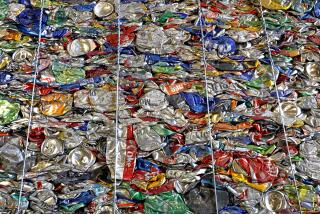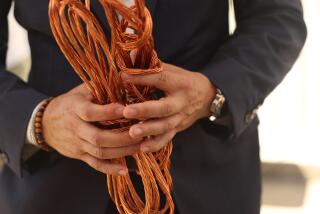Northeast Area Added to L.A.’s Recycling Net
- Share via
Trash recycling bins are being distributed this week to about 15,000 homes in several northeast neighborhoods of Los Angeles as part of a citywide expansion of voluntary recycling.
The distinctive yellow containers, some with 12-gallon and some with 14-gallon capacities, are being left at curbs by the Los Angeles Conservation Corps along with booklets explaining the recycling program. Special recycling trucks will begin weekly pickup one week after the containers are delivered.
In most cases, recycling pickups will be on a day other than regular trash pickup days, said Gyl Elliott, spokeswoman for the Los Angeles Bureau of Sanitation.
Residents included in the program will be asked to put aluminum and steel cans, glass bottles and jars and clear plastic soda bottles into the containers, then leave them, along with loose or bundled newspapers, at curb side on the recycling pickup day.
The recycling containers are being distributed on a staggered schedule to large portions of Atwater, Highland Park, Eagle Rock, Mount Washington and Silver Lake.
The program, called Recycle L.A. Phase Two, will nearly double the number of households involved in voluntary recycling, bringing the total to 90,000 distributed through all 15 Los Angeles City Council districts, Elliott said.
Other curb-side recycling areas, the earliest begun in 1985, now include about 45,000 households in Westside and San Fernando Valley neighborhoods. The materials collected at those houses are sold to several recycling firms, holding the overall cost of the collection to from 90 cents to $1.20 per house each month, Elliott said.
Some of those earlier programs called upon residents to separate different kinds of recyclable refuse into three containers. However, the Bureau of Sanitation decided to move ahead with single-container recycling because it proved easier on residents, Elliott said. Voluntary cooperation with recycling has generally run from 30% to 50%, she said.
The new recycling areas being opened this week are expected to cost more, as much as $3.66 per household each month, because of the complex logistics, Elliott said. The cost would be expected to fall as the program grows.
Elliott said the new pilot areas will help the bureau answer key questions such as how the market for recyclable refuse will sustain greater supply and what types of vehicles and containers work best.
The bureau will use the knowledge as the basis to propose mandatory recycling for all 720,000 households in the city, Elliott said. A recommendation for mandatory recycling will be presented to the Los Angeles City Council within a month, she said.
The council has directed the bureau to initiate recycling as a way to reduce the volume of trash rapidly filling the city’s landfill capacity.
More to Read
Sign up for Essential California
The most important California stories and recommendations in your inbox every morning.
You may occasionally receive promotional content from the Los Angeles Times.














